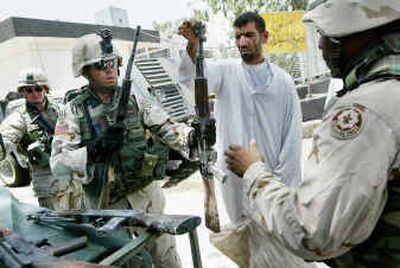Saboteurs strike at oil

BAGHDAD, Iraq – Insurgents stepped up their campaign against Iraq’s infrastructure Tuesday, blasting two oil pipelines and cutting the country’s oil exports. Gunmen also attacked a convoy of civilian contractors, killing four of them.
Authorities curbed oil exports through the Persian Gulf by half – from an average of 1.85 million barrels per day to more than 800,000 barrels – after saboteurs blasted the two pipelines on the Faw peninsula of southern Iraq.
The attacks sent temporary ripples through international petroleum markets, but crude futures ended lower. Contracts for U.S. light crude for July delivery rose as high as $38.40 during New York trading, before easing back to settle at $37.19 per barrel, down 40 cents. July contracts for Brent crude rose as high as $35.90 at one point before retreating to $35.29, down 20 cents in London.
Iraqi officials told Dow Jones Newswires they expected to have the damage repaired within a few days. However, petroleum analyst Paul Horsnell, the head of energy research at Barclays Capital in London, said that as a result of the blasts, Iraq would probably fail to meet its export target of 2 million barrels a day for June.
Reviving petroleum exports is the key to restoring Iraq’s economy after decades of war, international sanctions and Saddam Hussein’s tyranny. However, repeated attacks have slowed the process of returning Iraq, with the world’s second largest petroleum reserves after Saudi Arabia, to the forefront of global energy markets.
Insurgents are targeting the infrastructure apparently to undermine confidence in the new government, which takes power June 30. On Monday, a car bomb killed 13 people in Baghdad, including three foreign engineers working to restore the electricity sector.
Brig. Gen. Mark Kimmitt, the coalition deputy operations chief, said another convoy of contractors was ambushed Tuesday in Baghdad and that “some” people had been killed. He refused to give further details. Four contractors were killed, according to The New York Times.
A car bomb exploded Tuesday outside a coalition base near Hillah south of Baghdad, killing one Iraqi and wounding another, the U.S. military said. And gunmen killed an Iraqi police official in a town near Hillah as he went to work, the military said.
Meanwhile, new allegations surfaced about the professionalism of the Iraqi police, who are due to assume greater responsibility for security after the formal end of the occupation June 30.
On Tuesday, dozens of Iraqi Shiites complained that Shiite truck drivers who had sought refuge in a police station in the Sunni town of Fallujah were instead handed over to extremists, who killed them after they were unable to pay a ransom. Six of them were found dead Monday in a morgue in Ramadi, also a Sunni town.
At a protest rally, a 12-year-old boy, Mohammed Khudeir, said he was among those allegedly handed over by the police to a hardline cleric. But the cleric and his followers let him go, apparently because of his age.
“We tried to seek police protection, but the policemen handed us over,” Mohammed said. He said the cleric “handed us over to a group of Arabs who spoke with non-Iraqi accents. I was tortured for a while, but then I was released.”
Mohammed said the insurgents killed his brother and uncle.
One man, Alaa Mery, said that on June 8, he went to Fallujah to negotiate for the hostages’ release. He said he met with some Syrians who identified themselves as members of the extremist Wahhabist sect and said they were holding the drivers because they collaborated with the Americans.
The Syrians demanded the money, which the families could not pay, he said.
“Fallujah clerics and people made a big fuss regarding Abu Ghraib torture, but now they are killing and mutilating Muslims,” Mery said, referring to the American abuse of Iraqis at the Abu Ghraib prison. “They are not resistance. They are a copy of Saddam.”
Also Tuesday, differences emerged between the United States and Iraq’s interim government over control of the Republican Palace, used as headquarters for chief administrator L. Paul Bremer.
On his return Tuesday from the United States, interim President Ghazi al-Yawer said Iraq would insist on the return of the Republican Palace to Iraqi control.
U.S. officials have said they intend to use the palace, located in the Green Zone along the Tigris River, for offices that cannot be accommodated in the U.S. Embassy, which formally opens with the end of the occupation.
“There is no talk of inviting the United States to keep the Republican Palace as an embassy supplement,” al-Yawer told reporters. “We asked that the Republican Palace be vacated in the fastest opportunity for us to use it as Iraqis, as a Republican Palace or a museum. Whatever we do with it is a matter for Iraqi sovereignty. It is a symbol of Iraqi sovereignty.”
Coalition spokesman Dan Senor said the future of the palace and other facilities in the Green Zone were under discussion with Iraqi authorities. He noted that the U.S. Embassy would be one of America’s largest and “obviously we need substantial space, property, for the U.S. mission here.”
The Americans are also concerned about security if they are unable to hold on to most of the fortified Green Zone. Questions have been raised about the capabilities of the Iraqi police following recent incidents, including the Monday car bombing which was followed by rioting.